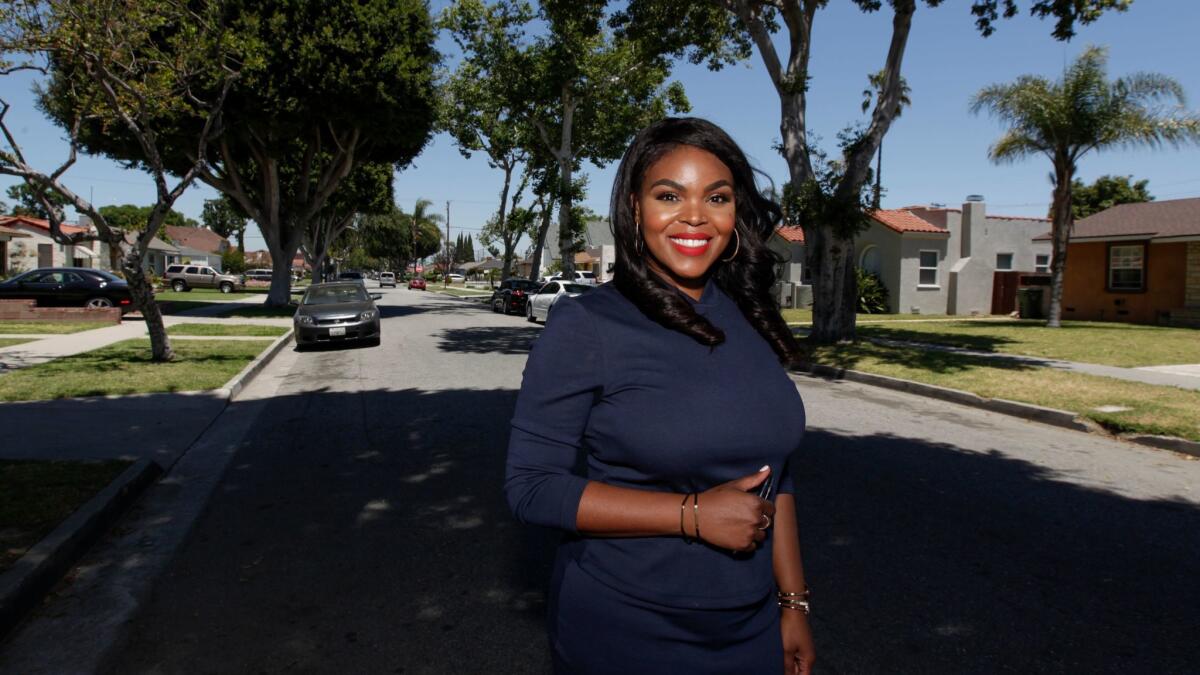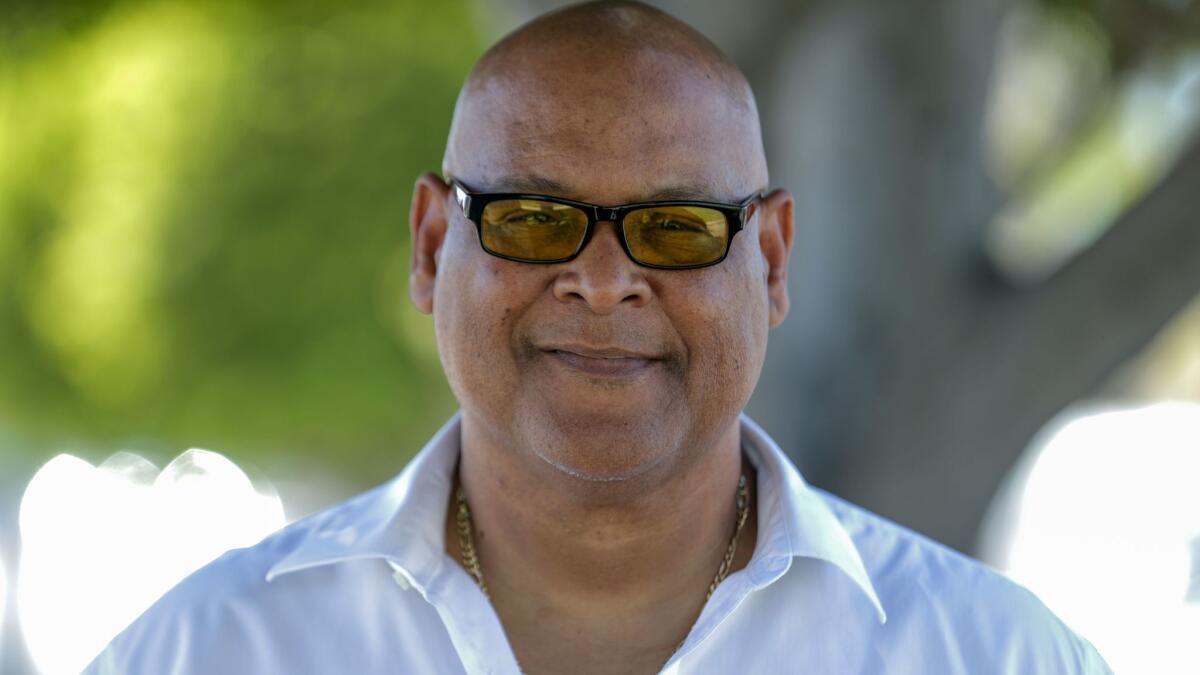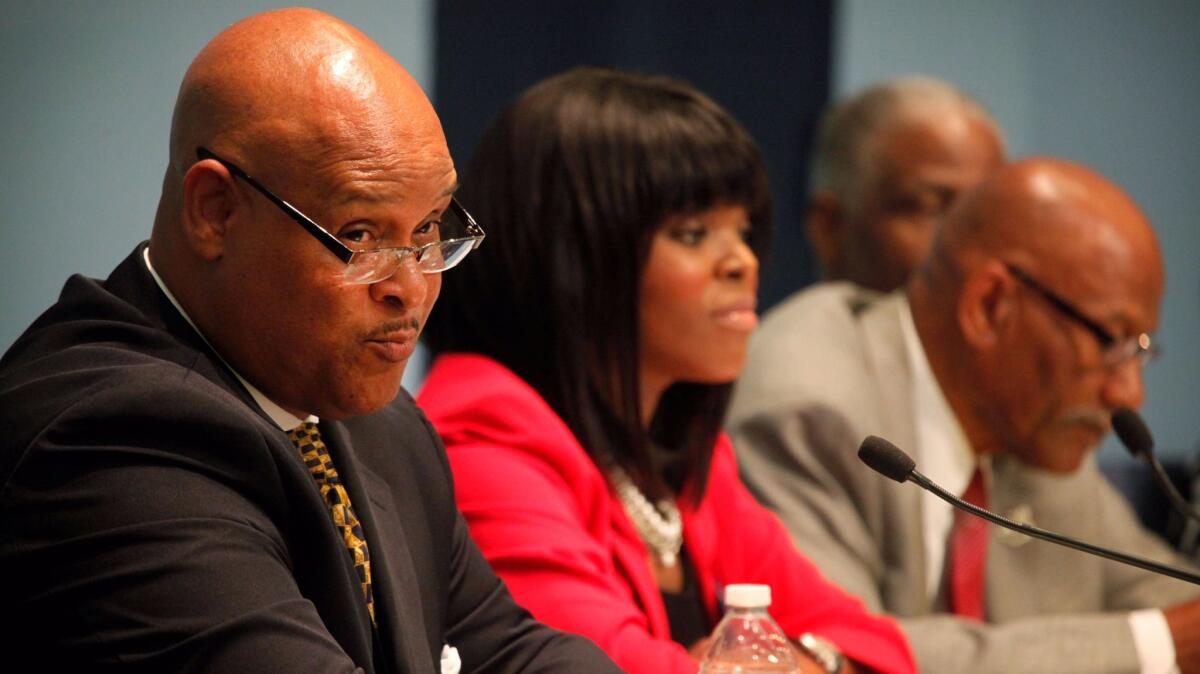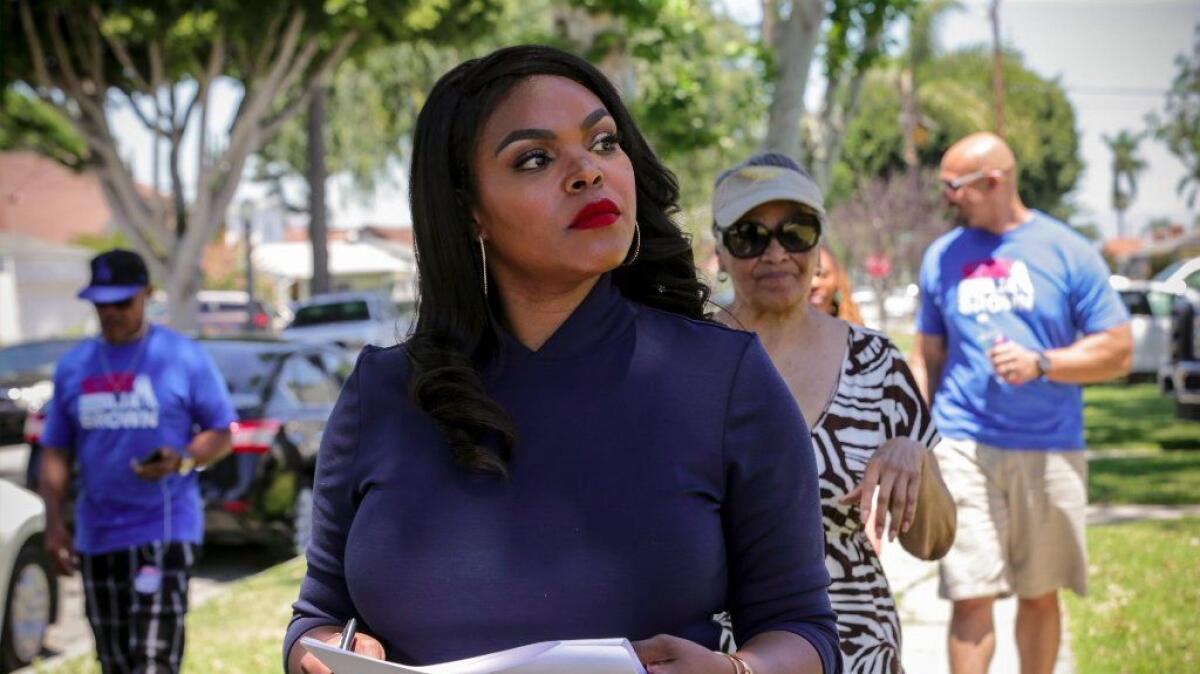The ‘gangster mayor’ vs. the next Brooklyn: Generations collide in Compton’s mayoral race

- Share via
Omar Bradley sits in a booth at the Compton IHOP and slides through photos on his iPhone of cracked streets, dead dogs and homeless people.
This is the vision of Compton that Bradley, 59, is trying to sell to voters in his longshot bid to regain the mayor’s job after a career tarnished by scandal: a city where the hype of revitalization doesn’t match the reality on the ground.
Compton has generated national attention for what many consider a remarkable turnabout in recent years. The crime and gang killings that for decades plagued the city had plummeted. Businesses are beginning to move back into the city, and property values are on the rise.
The upswing has elevated Compton Mayor Aja Brown’s image, with glowing profiles in national magazines. She has vowed to turn the south L.A. city into the next Brooklyn and has helped lure some of the city’s many famous sons and daughters, including Dr. Dre, Serena Williams and Kendrick Lamar, to help with this turnaround.
A generational clash: Gangster mayor vs. the next Brooklyn
Brown’s clean-cut image contrasts sharply with that of Bradley, who in 2004 was convicted of misappropriating public funds. That conviction was tossed out on appeal eight years later.
Brown, 35, is the clear favorite in Tuesday’s election, but Bradley has mounted an aggressive challenge, arguing that much of the Compton turnaround story is inflated and that Brown and City Hall have failed to take care of basic services. Once known as the “gangster mayor” — a moniker with which he now bristles that was based on his friendship with rappers like the late Eazy-E from seminal Compton rap group N.W.A — Bradley is banking on enough voters having fond memories of his previous tenure in office.
The race is, in many ways, a generational showdown, with voters choosing two distinctive visions of the city and two decidedly different candidates.
“She has professional training. She is open to the idea of marketing Compton as a place for people to come and live,” said Manuel Pastor, director for the Center for the Study of Immigrant Integration at USC, who has been tracking the mayoral race.
Brown’s reelection bid raised around $142,000 in advance of the April primary. On the other hand, Bradley, who has filed no campaign disclosure reports, says he has little money and is campaigning mostly door to door and at churches.
Pastor and others see an irony in these two African Americans battling for the top job in Compton. Latinos are now the majority of residents in the city. But many of them are immigrants — legal and otherwise — who are not able to vote. So for both candidates, the key to victory likely will be winning over black voters.
“Even as the population has changed dramatically, the voting population has changed less so,” Pastor said.

Omar Bradley’s long shadow
To get elected, Bradley needs to address the past.
From 1993 to 2001, he was the undisputed political boss of Compton. Some of the same qualities that made him popular — including his brash talk — also made him controversial.
He once attacked rap music’s love affair with Compton, claiming it was part of an effort by Jewish record executives to make money off blacks. He later apologized.
He denies that he declared himself the “gangster mayor,” but in the 1990s, he played up his street bona fides and touted his relationship with rap mogul Marion “Suge” Knight.
Under Bradley, Compton also built new housing and decreased a municipal work force that had become swollen. He got credit for keeping the streets clean and for disbanding a Compton police force that many residents had come to distrust.
In 2001, Kerman Maddox, a Los Angeles political consultant, said the city’s politics were reminiscent of the “gritty ward politics you see in New York or other cities in the East.”
“People will sabotage you, even if you’re trying to help. For a mayor, that puts loyalty at an incredible premium,” he said.
Among those who helped Bradley during his years as mayor were family members and ex-convicts who couldn’t find jobs elsewhere.
Now, a key part of his bid to topple Brown has been to cast her as an interloper and outsider.
“The value of Compton to those who don’t live here or are not from here is quite a bit different than if you live here or were born here,” Bradley said during an afternoon meal at the IHOP. “Back in my time, Compton was a place where African Americans and Latinos could thrive. You could buy a home and raise your children. They would go off to college. We would teach them to come back and give back to the pot that they took out of. That’s what made it great and produced champions — because we believed we were family.”
But in his final years as mayor, while Bradley was solidifying his power, he also was racking up accusation after accusation of cronyism and malfeasance.
And his mouth kept causing him problems — whether he was making troubling comments about Hitler or alleging that thousands of Latinos who voted against him “were not really citizens.”

Legal drama that won’t end
In 2001, Bradley lost his bid for reelection to Eric Perrodin by 261 votes. The loss, which was disputed all the way to the California Supreme Court, still stings him to this day.
The former mayor sees enemies in multiple places, including a “Los Angeles bureaucracy that doesn’t want an African American male with bravado to stand up.”
Bradley’s voided conviction in 2012 allowed him to run for mayor again one year later — when Brown emerged victorious.
But he still has a retrial — or as he calls it, a “witch hunt” — looming. That means that even if he were to defeat Brown — which would be no small feat — he would face the prospect of having to vacate his seat if convicted again.
At the IHOP late last month, Spaulding Settle, 74, at first eyed the former football star from afar. He then walked over to Bradley’s booth and shared memories about old times and old haunts that have since closed and people who have since died.
“Those were the good days,” Bradley told him.
“I’d love to see you come back,” Settle, an apartment building owner, told the ex-mayor before inviting him to go fishing on his boat.
During a nearly two-hour interview, Bradley recalled his time as a high school football star and repeatedly touted his ability to call a blitz even though he was a cornerback. Those memories on the field are interspersed with sharply bitter anecdotes of being cheated out of victories — often, he insists, by referees and players.
In his mind, nothing much has changed since then. Now, it’s just prosecutors, the media and others.
“If I don’t get cheated,” he said, “it’s abnormal.”
Is Aja Brown the face of new and improved Compton?
In the April primary, Brown won 47% of the vote to Bradley’s 27%, with four other candidates picking up the rest. If she had won just a couple of hundred more votes, she would have avoided a runoff.
Brown insists she’s not frustrated by this. “My frustration is that Mr. Bradley is putting the city through this process yet again after the city expressed to him that they don’t want him to be mayor in 2013,” she said.
On a recent Saturday, Brown knocked on doors on a well-kept Compton street, with Tony Curtis, 66, a retired minister, following close behind.
He pushed back at Bradley’s line about Brown not being from Compton.
“She has brought respect and dignity back to Compton,” Curtis said. “The city feels safer. She knows what the city needs.”
At each door, Brown brought up two key points: her opponent’s past and her commitment to fixing the city’s pothole problem.
Brown also talks about crime. The number of killings is down dramatically from Bradley’s days in office — mirroring a nationwide trend. In the first five months of last year, there were 15 homicides in Compton, an alarming jump from the year before. This year, with five months in the books, there have been just five.
Though the violence that made Compton infamous has receded significantly, the city still struggles with a rough reputation and a high poverty rate. The city also has been making a slow recovery since it was on the brink of bankruptcy four years ago.
Still, there have been strides. Last year, UPS announced it would open a massive packaging center on the site of a former brick factory. Several other businesses have been attracted by the city’s central location — a short distance from the ports, highways and airport.

A return to her mother’s hometown
Brown was born and raised in Altadena and earned her bachelor’s and master’s degrees in city planning on scholarship at USC while playing varsity volleyball. After working in city governments across Los Angeles County, she moved back to the city where her mother grew up.
Her mother, Brenda Jackson, was raised in Compton but left in her 20s after her mother — Aja’s grandmother — was killed during a home invasion in the 1970s.
“My mother left immediately. It was just too sad,” Brown told Vogue in 2013.
In 2009, after moving back with her husband, Van, she started a nonprofit as she plotted her run for the city’s top job. By 2013, she had unseated a longtime incumbent, Perrodin, to become the city’s youngest mayor at 31.
Sylvester Masha, 65, piles up trash to toss in a dumpster outside a Pentecostal church on Compton Boulevard that he helps run.
Every Saturday, Masha, who is originally from Nigeria and has lived in the U.S. for decades, helps organize a food bank. Last week, Bradley and Brown dominated conversation there, he said.
“People came with so many stories about Bradley,” he said. “Blah, blah, blah … corruption and many things.
“I’m voting for Aja because of the record of Bradley,” he said. “This is a young lady who is not an insider.”
While standing outside her campaign office on a hot day last month, Brown spies a beat-up sedan with an Omar Bradley sign and a bullhorn driving by, urging voters to “vote for someone from Compton.”
She scoffs at the idea that Compton can only truly be represented by someone who has lived a lifetime here. The rhetoric is divisive in a city that went from being 20% Latino in 1980 to 65% Latino in 2010, she said.
“It’s a microcosm of what Omar Bradley represents in Compton,” she said. “He wants Compton to return to the place that it used to be. No place stays the same.”
As supporters get angry about the sedan with the bullhorn, Brown remains serene, with a smile on her face, and exclaims to no one in particular:
“No one about to let Omar Bradley drive me crazy.”
ALSO
Thousands arrive in Compton to give Kendrick Lamar a hero's welcome
Compton hopes its many celebrities can help reshape its image — and its economic fortunes
Sign up for Essential California
The most important California stories and recommendations in your inbox every morning.
You may occasionally receive promotional content from the Los Angeles Times.








